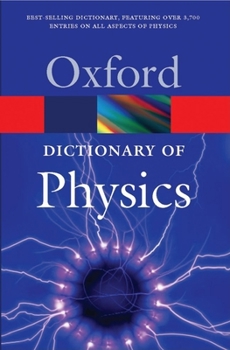A Dictionary of Physics (Oxford Quick Reference)
Select Format
Select Condition 
Book Overview
The revised and updated Fifth Edition of the most popular paperback dictionary of physics available. Containing 32 pages of new entries, and now with biographies of key scientists, A Dictionary of Physics covers all of the most commonly encountered terms and concepts of physics. There are over 3,500 clear and concise entries, including topics such as group theory, particle-beam experiments, radioisotope imaging, and spherical harmonics. Longer feature articles on important topics, such as crystal defects, magnetic resonance imaging, and the solar system are also provided. Chronologies chart discoveries in the main fields of physics, including atomic theory, cosmology, and microscopy. Comprehensive and up-to-date, this is the ideal reference tool for students of physics.
Format:Paperback
Language:English
ISBN:0192806289
ISBN13:9780192806284
Release Date:October 2005
Publisher:Oxford University Press
Length:592 Pages
Weight:0.95 lbs.
Dimensions:5.0" x 1.5" x 7.7"
Customer Reviews
2 ratings
Useful reference
Published by Thriftbooks.com User , 24 years ago
It is tempting to compare this dictionary with the The Penguin Dictionary of Physics (ISBN 0-14-051459-7). They are both coming from an established British publishing house, both are paperbacks, both the same size, both updated in the same year (2000), and, curiously, they have both been prepared by Market House Books, Ltd. Jumping to the conclusion that we are talking about variations of the same book would have been erroneous, though. A quick glance at the inside reveals the differences. Although the difference in the nominal number of terms defined is not that great (4500 for Penguin vs. 3500 - sometimes claimed even 4000 - for Oxford), the subjective feeling is that Penguin knows a lot more terms. Oxford, on the other hand, also contains short biographies of selected scientists, articles on each of the 109 chemical elements, some dozen two-page feature articles on selected topics like Big Bang, Free Electron Theory etc, and about just as many chronologies of selected areas of physics. Also, the definition of terms are on average longer in the Oxford dictionary - the definition of "orbital" is, for instance, two whole pages long, "death of a star" takes up one and a half page, etc. The illustrations in Penguin vastly outnumber those in Oxford, but I found those latter more informative. Both delve into technology as well, especially semiconductor technology, and, for my opinion, spend (or waste) too much space on computer science technology. Do we really need CPU, RAM, CD-ROM, DAT etc. defined in a Physics dictionary?Which one is more useful? As a non-native speaker, it is likely that I use it differently than a native speaker would, so your mileage may vary. I've been educated in physics in my native language, and I think in it when I think physics. When I have to write in English, I occasionally encounter a term which I am not quite sure whether I know the correct English expression, although it is lurking somewhere in the back of my head. So it's a time to check it in the dictionary. It is likely that I will already find it in Penguin, and not find it in Oxford. In the latter case, I have to look for a broader term to find it. Searching through Oxford is therefore somewhat more time-consuming. However, the process is reversed when I don't already know in advance the term I want to check, but I do know the broader term, then Oxford comes in more handy. So, in a way, I find the two dictionaries complementary.
Perfect reference guide
Published by Thriftbooks.com User , 25 years ago
General describtion: This book describes hundreds if not thousands of different concepts of physics, in just a few lines. It covers concepts of brand new physics like string theory, and explains the most important concepts like relativity in a several pages long, well understandable article. Style: Since I used this book to quickly find out what a certain concept meant, I was not always completely known with the physics sometimes required to understand the concept. Because of that, their were a few occasions were it was no use, because to be able to understand concept A, you first needed to grasp B, which required you to know C and so on. This however, is more to blame on me, for me wanting to know things I don't actually need to know, and therefor I often didn't have the required physics at hand. Complete 'newbies' to physics should not buy this, since one should be a bit familiar with basic physics, because the dictionary often refers to other concepts, to explain a certain subject.Layout: It's naturally alfabetically sorted, but it lacks the black boxes at the side some dictionaries have, that indicate where a new letter starts. Looking things up is generally not a problem. Plus: *At the back some good appendixes, rather usefull, though too few too my taste, but I usually want too much. *Very up-to-dateMinus: *No 'black boxes' that indicate where the letters start *The dictionary sometimes liked to refer too much to other concepts, causing that you need to read 25 different concepts to understand one single concept.






